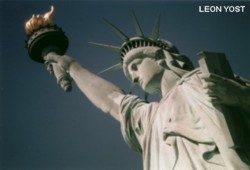 |  |  |
|
| ||
 |  |  |
 |  |  |
|
| ||
 |  |  |
|
|
Originally appeared as a Star Ledger editorial on Wednesday, April 4, 2001.
Acting Gov. Donald DiFrancesco's walk down Wall Street wasn't illegal. It didn't violate ethics rules. And the $135,000 profit he and his wife reported on their tax returns certainly doesn't make him a financial master of the universe.
What it does make DiFrancesco is a powerful insider with no apparent sense of how special deals breed distrust. Voters can reasonably ask whether his access or connection to these arrangements reflects astute business acumen or his powerful position in state government.
DiFrancesco insists the stock deals were not preferential treatment but normal, widely available investments. But he is not the average man in the street; he's not even the average business leader. He is a man whose word controls legislation and large amounts of government money. Any connection to special stock deals or entanglement with government-connected businesses is going to raise suspicions.
The stock deals were in his wife's account. The DiFrancescos file their income taxes jointly. But the dealings follow on the heels of other business transactions that have raised concerns.
It was revealed earlier that DiFrancesco borrowed $150,000 from a friend, Anthony Sartor, who does big business with the state. He also benefited indirectly from a $225,000 payment from K. Hovnanian Partners, a major real estate developer with extensive interests before the state. This is a leader who cannot steer clear of deals that raise ethical questions.
In their stock dealings, the DiFrancescos' tax returns show, the couple invested in more than two dozen hard-to- get initial public stock offerings, or IPOs, and made money on all but four. These stocks often sold for hefty profits after a day or less.
Initial public offerings are usually reserved for an investment firm's best clients, including big institutions. The acting governor is not a major investor, with a portfolio totaling less than $50,000. His wife holds something more than $250,000, although disclosure forms don't reveal precisely how much. Even together, they wouldn't appear to rise to the level of major Wall Street players.
IPO stocks can double in value during the first few hours of trading. Every investor wants such opportunities, and most can never get close. To say these opportunities are available to any active investor of means is like saying any music lover has a realistic chance of getting front-row seats at the next Bruce Springsteen concert.
Adding to the appearance problem, the DiFrancescos' brokerage firm, Morgan Stanley Dean Witter & Co., does business with the state, as do most of the big Wall Street firms. Morgan also has a senior vice president who is a major campaign contributor to DiFrancesco and the GOP.
DiFrancesco is not the only politician to profit from sweet IPO deals. Almost seven years ago, Sen. Robert Torricelli made $144,000, while still a congressman, on an initial offering of a Perth Amboy savings bank stock. When word got out, Torricelli admitted he'd long been friends with the bank's chairman but insisted there was no favoritism. Torricelli then pledged that he would forgo such deals, acknowledging "public debate and concern about the fairness" of the transaction.
Two years later, Torricelli reaped $52,446 on another IPO through his blind trust.
DiFrancesco says no one else has disclosed as much as he has, and the concern about his stock dealings unfairly implies that they were improper. But appearances matter. It is hard for the public to distinguish access to an IPO from the appearance of special treatment.
DiFrancesco is a capable politician with a record of solid accomplishment. GOP stalwarts may well marvel at how quickly he has gone from the catbird seat to the hot seat. If the damaging revelations keep coming, they may also wonder about his viability as a candidate for governor.
 Your Ancestors' Story |
 Bruce Springsteen's Jersey Shore Rock Haven! |

|
UrbanTimes.com |